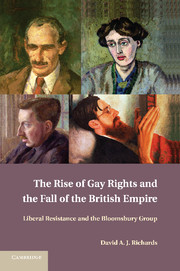 The Rise of Gay Rights and the Fall of the British Empire
The Rise of Gay Rights and the Fall of the British Empire 3 - The Rise of Gay Rights
Published online by Cambridge University Press: 05 June 2014
Summary
We turn now to the close study of the resistance movement I call gay rights, several of whose British advocates (John Addington Symonds, Oscar Wilde, and Edward Carpenter) drew inspiration from the life and poetry of the American poet Walt Whitman, and two of whom (Wilde and Carpenter) visited, in what can only be called a quasi-religious pilgrimage, a man they regard as the prophet of gay rights. It is not at all surprising that both Wilde and Carpenter should have interpreted Whitman's great poetry collection Leaves of Grass, in particular, the “Calamus” poems, as calling for a new opening to homoerotic experience that was, for Whitman, connected to a more inclusive understanding of democracy. Indeed, I have no doubt this is the best interpretation of the poem, as I have argued at some length elsewhere.
Oscar Wilde made a point of visiting Whitman when he lectured in the United States, telling a batch of reporters, “There is something so Greek and sane about his poetry.” Whitman evidently made no effort, as he would later do with Symonds (whom he never met), to conceal his homosexuality. Wilde later said, “The kiss of Walt Whitman is still on my lips.” Wilde, like Symonds, married and had children, but other than their common Hellenism (which Wilde, a brilliant undergraduate, had imbibed from Walter Pater at Oxford), the similarity ends there. Symonds lived mainly abroad, did not publish his works on homosexuality to a general public in his lifetime, and, even then, the published works did so in a defensive and ambivalent way that certainly was not wholly honest to his convictions. Wilde forged a style of living and writing that explored homosexuality and ironic wit to question and probe the Victorian rigid boundaries of gender and class.
- Type
- Chapter
- Information
- The Rise of Gay Rights and the Fall of the British EmpireLiberal Resistance and the Bloomsbury Group, pp. 97 - 139Publisher: Cambridge University PressPrint publication year: 2013


